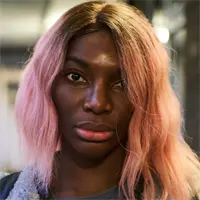I May Destroy You's Golden Globes snub raises the question of what stories are seen as "universal"
-

The snubbing of Michaela Coel's BBC/HBO genre-defying series quickly generated outrage, including from celebrities like Kathy Griffin and Emmy Rossum. Even an Emily in Paris writer was outraged. "Of course, one awards show cannot and should not cement a show’s legacy, but Coel’s snubbing by the Hollywood Foreign Press Association is particularly tough to swallow when one recalls the fanfare with which Phoebe Waller-Bridge’s Fleabag was met at the same ceremony in 2020," says Emma Specter. "(Waller-Bridge’s show scored three nominations and two wins, one for best musical or comedy TV series.) It’s facile to suggest that Fleabag and I May Destroy You are of a kind just because they both center around far-reaching stories about women (and, to be fair, it took until season two for Fleabag to get its Golden Globe noms). But it’s difficult not to wonder whether Coel might be a better candidate for awards-season plaudits if her story were just a little more, well...white (or, to put it in the coded language that Hollywood execs favor, a little more universal). One in six American women experience sexual assault in their lifetimes, meaning that in essence the story Coel is telling should be one of the most universal of all. That said, women of color are more likely to be assaulted than white women, even though 80% of rapes are reported by white women. Coel created a piece of work that addressed that reality head-on, confidently centering a Black survivor of sexual assault and shedding light on the myriad ways in which Black survivors of all genders and sexualities are likely to be disbelieved or let down by the system that purports to protect them. The narratives around sexual assault that we see play out on TV and in movies are still weighted toward white protagonists; why is a show that so boldly breaks those barriers not commended for it at one of the industry’s highest levels? Is it possible that the Hollywood Foreign Press Association is just more comfortable seeing a woman who looks like Waller-Bridge push the boundaries of what it means to be alive, angst ridden, and female? If Coel’s story took place in a whiter, higher-income part of London, would it be easier for HFPA voters to see its merit?"
ALSO:
- Why were the Golden Globe TV nominees overwhelmingly white?: "While strong diversity gains were made on the film side of the nominations list, looking at the 40 acting nominations in the TV categories, only two Black actors made the cut — Don Cheadle for Black Monday and John Boyega for Small Axe," says James Hibberd. "Two other people of color were also nominated: Egyptian actor Ramy Youssef for Hulu's Ramy and Anya Taylor-Joy (who is Argentine-British and identifies as Latina) was nominated for her star-making turn in Netflix's The Queen's Gambit. So it wasn't just that the resulting nominees were overwhelmingly white during a year that had fewer shows on the air, but that they were overwhelmingly white in a year when there were obvious standout performances by non-white actors who critics and oddsmakers strongly believed gave award-worthy performances. And yet: Netflix's Emily in Paris shocked by getting a Comedy Series nod, instead of, say, Netflix's Never Have I Ever or ABC's Black-ish (admittedly neither were favored, but then again, nor was Emily in Paris). Same with Starz' P-Valley getting dissed on the drama side."
- Shutting out people of color in the vast majority of acting categories has become a Golden Globes tradition in TV categories
TOPICS: I May Destroy You, Fleabag, Michaela Coel, Diversity, Golden Globe Awards
More I May Destroy You on Primetimer:- Presenting TV's best friendships, from Seinfeld to PEN15 to Insecure
- HBO is leaving Euphoria fans to fend for themselves after "traumatizing" them
- The miniseries has evolved from inside joke to becoming hugely popular in the streaming TV era
- Michaela Coel's Emmys speech dedicated to sexual assault survivors was something rare -- a speech directed at viewers, not attendees
